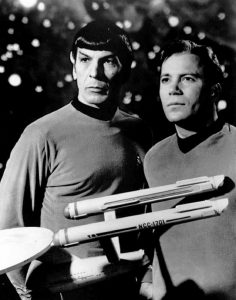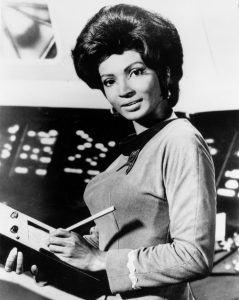Star Trek, opens a new window began its first run on September 8, 1966, but I was too young to appreciate it then. By the time Star Trek went into syndication I was a teenager who took to those stories of exploration and heroism exactly the opposite of the way a Klingon takes to Tribbles. I loved science fiction so I was swept off my feet by Captain Kirk and his crew, especially Spock who was very different yet had an important role to play. So, the Enterprise crew was also a window into diversity—a diversity I didn’t experience in my small midwestern town.
How much did I love Star Trek? One of my favorite uncles knew he could get me going just by beginning a sentence with “Lost in Space is better than Star Trek because...:” His argument always included ridiculous reasons like “because Lost in Space has monsters” so even when I knew he was teasing, I couldn’t resist defending my beloved Enterprise and its crew.
Feed your nostalgia with These are the Voyages (vols. 1–3)
These Are the Voyages, TOS Season One
These Are the Voyages, TOS Season Two
These Are the Voyages, TOS Season Three
Now, 50 years after its debut, and with the addition of many series to the Star Trek universe, that ground-breaking show is designated Star Trek: The Original Series. Gene Roddenberry’s vision of humans, conquering the problems of poverty and social injustice on Earth, ready to venture into the galaxy as founding members of a United Federation of Planets has passed the test of time—it has lived long and prospered. Star Trek has inspired countless scientists and inventors because of adherence to mostly (but ok, not all) fact-based concepts.
Star Trek introduced the Vulcan philosophy of Infinite Diversity in Infinite Combinations (IDIC) which has been an inspiration to many as well, and in the late 1960s this was a message that was fairly new to TV. One of the best known examples is the story told by Nichelle Nichols of how thinking at one point she would leave the show, a conversation with Dr. Martin Luther King, Jr. convinced her to stay. He insisted that the need for her presence on TV as a black woman Starfleet officer was more important than her desire for a career on Broadway. Dr. King was right. Nichelle Nichols became the voice of diversity for NASA, inspiring young women and men of color to consider careers in science. During her time on the space shuttle Endeavor, Dr. Mae Jemison, the first black woman astronaut started her shift with Lt. Uhura’s iconic phrase, “hailing frequencies open.”
The five year mission has become The Fifty-year Mission.
Few TV shows have had the staying power of Gene Rodenberry’s Star Trek. The world of Star Trek now includes books, movies, and several TV series that stand as great entertainment in their own right. So far, Star Trek hasn’t met the fate of “all good things” and I for one hope it never does.
In the mood for a five year mission of your own? Here's a catalog search for all of Star Trek.




